The School issued iPads Mini to students in years 5 and 6 of the MBBS course at the beginning of the 2013/14 academic term.
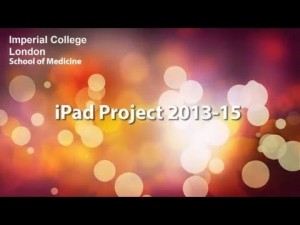
The key implementations introduced as part of the pilot have focused on the following areas:
iBooks
iBooks have been developed in order to standardise the delivery of course related materials for the different clinical attachments. Once the iBooks are downloaded on the iPads, they can be accessed offline. The iBooks offer a range of interactions designed by academics to make the learning experience more engaging for students. The image below shows some of the iBooks developed for years 5 and 6.
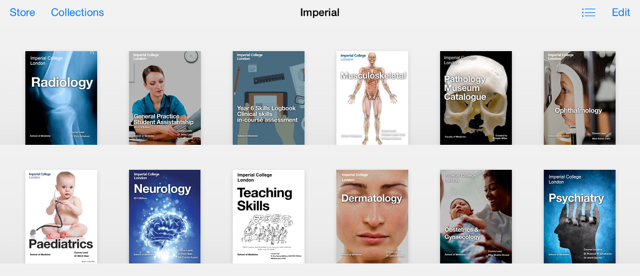
Students can download the iBooks via the Mobile Device Management System (MDM): AirWatch Secure Content Locker provided by ICT.
Overall, the feedback received from academics and students has been very positive. They like the fact the iBooks can be accessed off-line and they provide a lot of engaging interactions.
The iBooks developed can be accessed via the iPad Project Organisation in Blackboard: http://bit.ly/1rlBKXF
Electronic submissions and signoffs
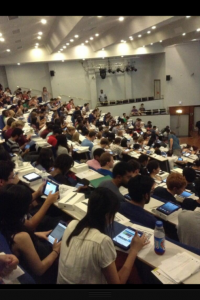 Electronic submissions and signoffs have been piloted using the eForms iPad App. It allows submissions of assessments (end of attachment, DOPS, etc.) via student iPads. The system allows clinicians to electronically sign forms online/offline and to receive an electronic copy of the submissions via email. Students also receive confirmation via email and administrators can track submissions online.
Electronic submissions and signoffs have been piloted using the eForms iPad App. It allows submissions of assessments (end of attachment, DOPS, etc.) via student iPads. The system allows clinicians to electronically sign forms online/offline and to receive an electronic copy of the submissions via email. Students also receive confirmation via email and administrators can track submissions online.
SharePoint has also been piloted for electronic submissions in years 3, 5 and 6 to accommodate open-ended questions requiring formatting as well as submitting attachments (PDF, Word documents, etc.).
In total, over 100 electronic submissions have been introduced in years 5 & 6. Feedback so far has been positive although some students have expressed preference for paper based submissions.
iCalendars
iCalendars have also been deployed for some clinical attachments (nearly 100 iCalendars), allowing students to access their calendars/timetables on their iPads and/or smartphones. Due to the positive feedback received from students on the use of iCalendars, the School has decided to implement iCalendars for all clinical attachments from January 2015.
Other Apps
We have also received positive feedback on the use of virtual clickers especially during the Pathology course. The students have also been very receptive to the use of the BMJ Best Practice App provided by the library.
The work done so far on the Mobile Medical Education Pilot Project provides evidence of the benefits in the provision of electronic submissions, iCalendars and the distribution of course and learning related materials on the students’ devices via iBooks. The digitisation of clinical related assessments (e-forms) provides a more efficient and robust mechanism to audit assessment submissions during attachments.
A Working Group will be setup to evaluate the iPad pilot and make recommendations to the School on the way forward in relation to the School’s Mobile Learning Strategy. The recommendations will be made available by February 2015.
A CPD course: ‘Creating Mobile Medical Education: Successful Implementation in Practice’ has been setup based on the experience gained during this project at the School. All the implementations carried out as part of this project will be demonstrated during the course.
Guest speakers from Manchester and Leeds Medical Schools will also present their latest developments on Mobile Medical Education. For further information about the course please visit: http://bit.ly/1AR24tQ
For further information contact us at: elearning.medicine@imperial.ac.uk
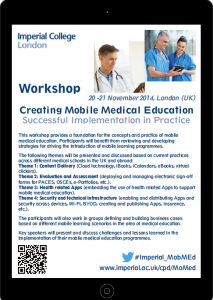
Dr Maria Toro-Troconis
E-Learning Strategy and Development Manager
Faculty of Medicine
Read The School of Medicine Mobile Medical Education Pilot Project in full


 In partnership with Zagreb Institute for the Culture of Health, WHO Collaborating Centre for Public Health Education and Training will be delivering the Advanced Leadership course in Dubrovnik, Croatia from 5-12 August 2017.
In partnership with Zagreb Institute for the Culture of Health, WHO Collaborating Centre for Public Health Education and Training will be delivering the Advanced Leadership course in Dubrovnik, Croatia from 5-12 August 2017. 4’s Stand Up To Cancer telethon on Friday 14 October. The annual live TV event is a partnership between C4 and Cancer Research UK and features stars from film, music and television. The production company behind the 2016 event approached ICCESS after seeing recent media publicity about the Centre’s pioneering haptic device for rectal examinations.
4’s Stand Up To Cancer telethon on Friday 14 October. The annual live TV event is a partnership between C4 and Cancer Research UK and features stars from film, music and television. The production company behind the 2016 event approached ICCESS after seeing recent media publicity about the Centre’s pioneering haptic device for rectal examinations.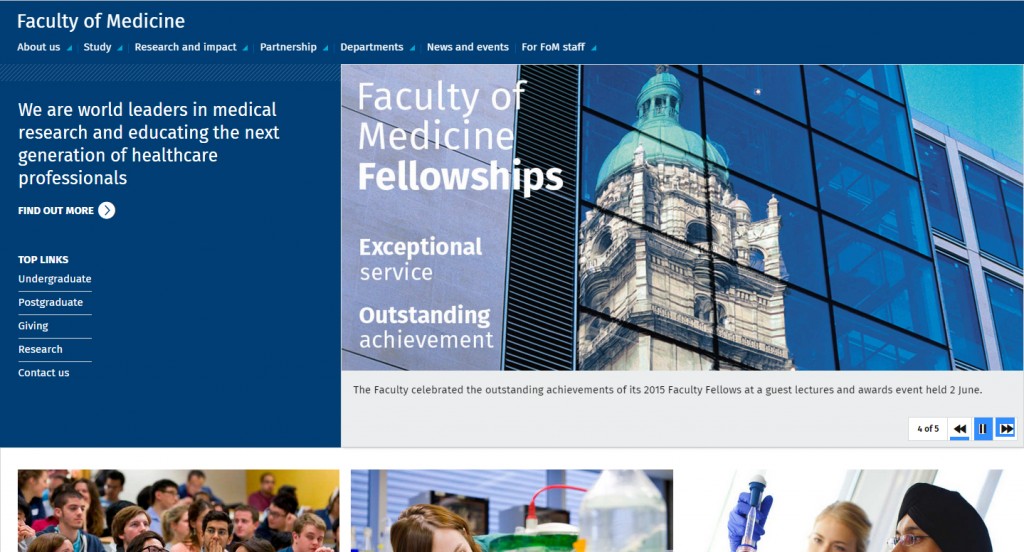













 The data from the survey is being analysed – we will be working to identify some key activities to improve communication across the Faculty and in particular improve communication across the campuses which appeared to be a concern for a lot of those that responded. It also appears that information flows across all areas in the Faculty aren’t ideal at present so again, we will be looking at what could be done to improve this.
The data from the survey is being analysed – we will be working to identify some key activities to improve communication across the Faculty and in particular improve communication across the campuses which appeared to be a concern for a lot of those that responded. It also appears that information flows across all areas in the Faculty aren’t ideal at present so again, we will be looking at what could be done to improve this.